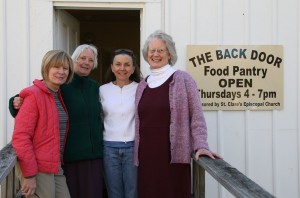Mission Statement
We are committed to helping people in need by supplying food to all those who come to our door during our distribution hours in a welcoming, friendly, and non-judgmental environment.
History
 The Back Door Food Pantry was founded in March 2007, by four local women dedicated to reducing hunger in the Ann Arbor area. Originally providing “basic calories” by distributing canned and packaged goods, the pantry now provides an array of nutritious food items including bread, eggs, milk, meats and local produce. The pantry also distributes personal hygiene items and paper products. Prior to the start of the pandemic, we were able to provide help with food stamp applications and other financial and food aid programs.
The Back Door Food Pantry was founded in March 2007, by four local women dedicated to reducing hunger in the Ann Arbor area. Originally providing “basic calories” by distributing canned and packaged goods, the pantry now provides an array of nutritious food items including bread, eggs, milk, meats and local produce. The pantry also distributes personal hygiene items and paper products. Prior to the start of the pandemic, we were able to provide help with food stamp applications and other financial and food aid programs.
The pantry is located at the Wisdom House on the Genesis Campus at 2309 Packard Street. It is open every Thursday from 4 to 7 PM. Each week the pantry distributes groceries, fresh produce, meats, bread and basic hygiene items are distributed. During the current pandemic, upto 160 individuals per week depend on the pantry for basic food support.
The Back Door Food Pantry began as an outreach program of St Clare’s Episcopal Church, distributing items from Food Gatherers. The pantry is operated completely by a dedicated group of volunteers who help with everything from ordering food, unloading delivery trucks, stocking shelves and helping distribute food each and every week of the year! Since opening its doors, the need for food assistance in our community has increased significantly. To help meet this growing need, Temple Beth Emeth joined the effort in early 2009 providing additional funding and more volunteers. In late 2010, the Muslim community also joined the effort to help further expand the reach of the food pantry.
In February 2012, the Back Door Food Pantry become a “client choice” pantry allowing clients to choose from a wide variety of food to better meet their personal dietary needs. The client choice approach also provides clients a greater sense of dignity and higher satisfaction with the food they are able to choose. It also reduces waste and ultimate reduces costs.